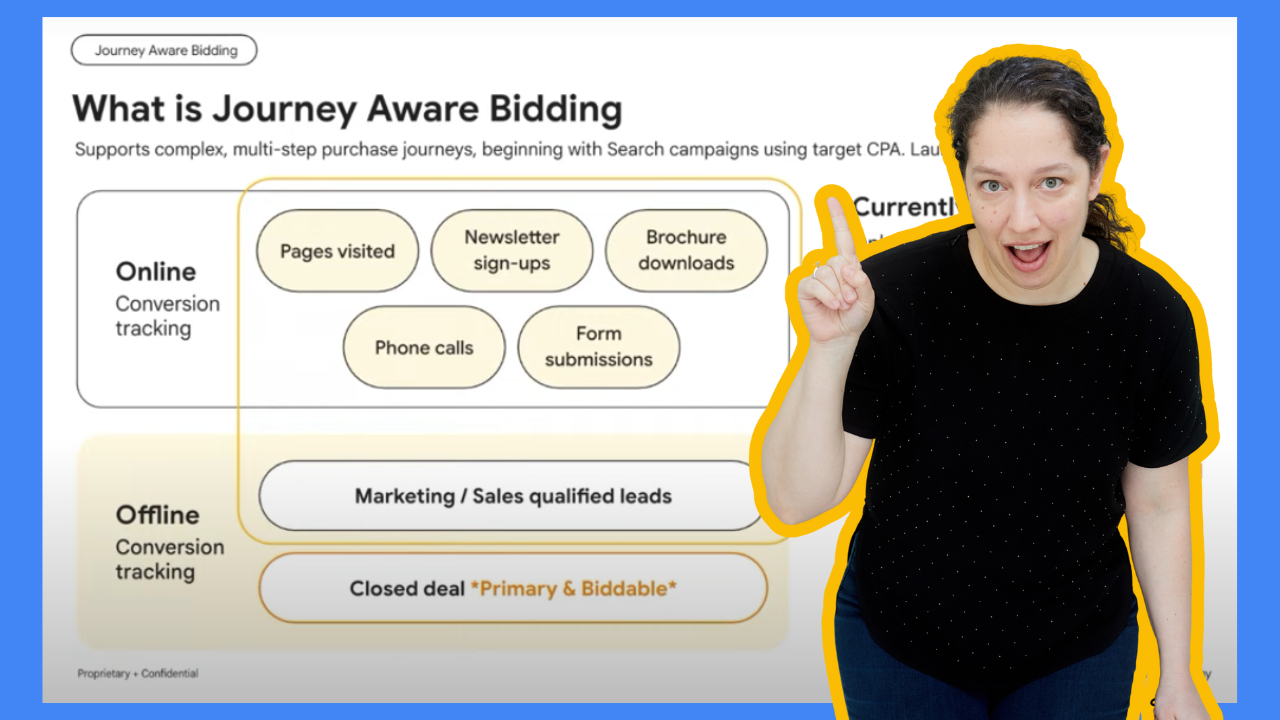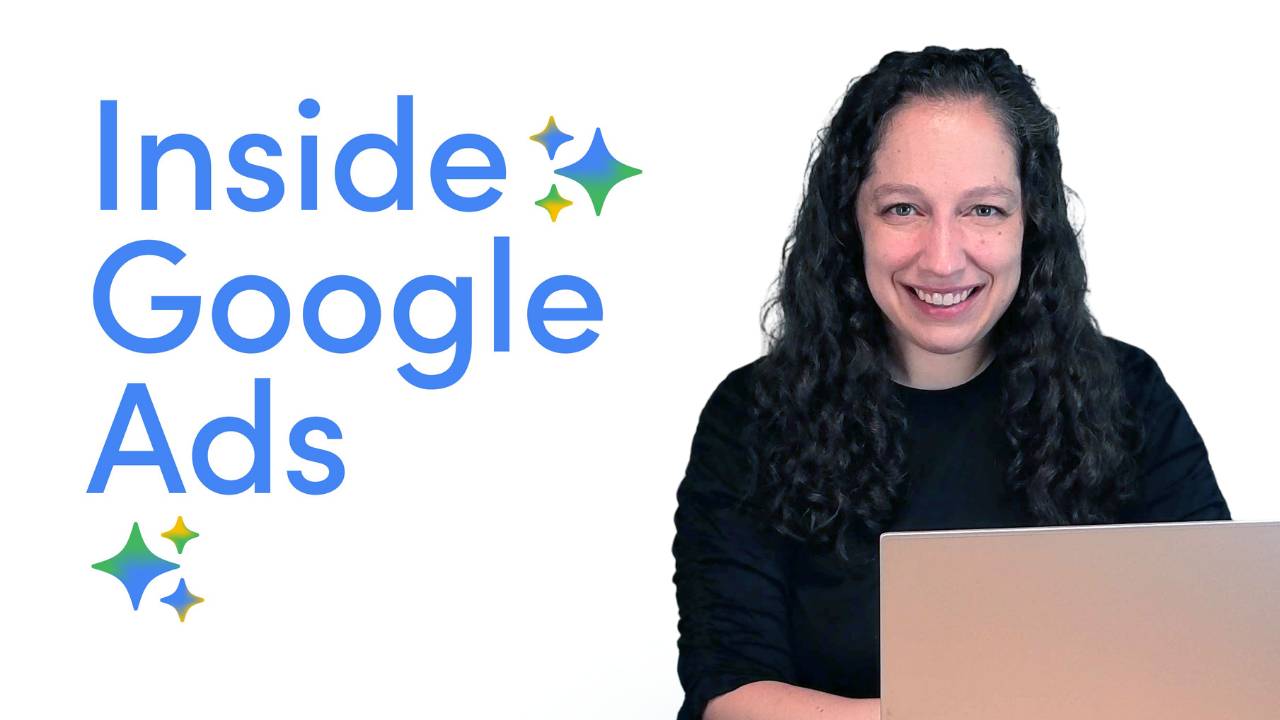Google Ads Journey Aware Bidding: The next bidding innovation for lead gen [UPDATED]
Nov 11, 2025
By: Jyll Saskin Gales, Google Ads Coach
Is it possible that the way you bid on Google Ads is about to get a major upgrade? For a while now, sophisticated lead generation advertisers have been using a clever approach called value-based bidding. This method assigns different values to different types of leads, which helps your campaigns focus on finding the most promising ones. But what if Google Ads could go even further, looking at the entire customer journey, not just the initial lead?
Google recently announced a new concept called "Journey Aware Bidding." This development signals a shift toward a more holistic approach to bidding for leads. Instead of using arbitrary values, this new technology is aware of and responsive to the entire path a customer takes. If you’re a small business owner, a marketing manager, or anyone who runs lead gen campaigns on Google Ads, this could change how you approach your strategy.
Here’s what you can expect to learn in this article:
-
How the current system of value-based bidding works for lead generation
-
The two main methods you can use to assign values to your leads
-
How Journey Aware Bidding is the next evolution of this bidding strategy
-
How to set up your current campaigns to make the most of what's available now, and be ready for future innovations
How Value-Based Bidding Works for Lead Gen
Think of value-based bidding as a way to give your Google Ads campaigns a set of priorities. Instead of simply telling Google Ads to "get as many conversions as possible," you're giving it more specific instructions: "get me the conversions that are worth the most." This approach moves beyond just counting conversions and instead focuses on maximizing your return on ad spend (ROAS). By optimizing for conversion value, you guide your campaigns to prioritize the leads that are most likely to become paying customers, helping you get a better return for every dollar you spend.
Assigning Values to Your Leads
The key to a successful value-based bidding strategy is assigning accurate values to your leads. There are two primary ways to do this:
-
The Scoring System: This is a straightforward method where you create a scoring system based on the quality of a lead. For example, a basic lead that simply filled out a contact form might be given a value of 10. A marketing-qualified lead (MQL) who downloaded a case study and spent time on your site might get a value of 50. Finally, a sales-qualified lead (SQL) that has been vetted by your sales team might be given a value of 500. You can adjust these values based on your own sales process and how often each type of lead becomes a customer.
-
The Revenue-Based Approach: This method is a bit more precise and ties the lead value directly to your business's revenue. Here, you use your actual sales data to determine the value of a lead. Let's say your average order value is $1,000, and you know that, on average, 10% of your leads become paying customers. In this scenario, you could assign a value of $100 to each new lead. When a lead successfully converts into a customer, you can then update their conversion value to the full amount of the sale, which in this case would be $1,000. This provides Google with more accurate data to inform its bidding decisions over time.
Connecting Your CRM to Google Ads with Offline Conversion Tracking
To make either of these approaches work effectively, you need a way to connect the information from your sales process back to your Google Ads account. This is done through a process called offline conversion tracking. Your customer relationship management (CRM) system holds all the crucial data about your leads; their journey, their interactions, and their final value. By connecting your CRM to Google Ads, you can feed that information back into your campaigns. This allows Google to see not just that a conversion happened, but what its actual value was.
For this system to work well, you need enough data for Google to learn from. Google suggests having at least 15 conversions in 30 days to use value-based bidding, but in practice, you’ll likely need more to see truly optimal performance. Aiming for at least 30 conversions in a 30-day period, or even 90 or more, can give the system the information it needs to make smarter decisions about which users to target and how much to bid for them.
What’s Next: Journey Aware Bidding
Value-based bidding is powerful, but it's still based on the values you assign at specific points in the customer journey. Now, imagine a system that can see and understand the entire journey. This is the vision behind Google's Journey Aware Bidding.
Under the current system, only the Primary conversion actions you are optimizing toward (like a closed deal) are used to inform Smart Bidding predictions. Journey Aware Bidding changes this. It supports complex, multi-step purchase journeys, beginning with Search campaigns. With this update, Smart Bidding will still optimize for your final biddable conversions, but it will now use all of your conversion actions to improve performance. This includes the Secondary, earlier steps like pages visited, newsletter sign-ups, phone calls, form submissions, and even marketing/sales qualified leads - data points that are currently ignored by the bidding algorithm.
This new bidding improvement is aware of and responsive to the entire customer journey in Search campaigns. It is launching in 2026 for Search campaigns using Target CPA.
This process uses the earlier steps a customer takes as strong signals to improve its bidding, making it "journey aware" rather than only "final destination focused."
This could potentially make it more precise and efficient at finding the most valuable customers, not just the most valuable leads.
This evolution goes hand-in-hand with recent updates that allow you to classify conversions according to different stages, such as leads, marketing-qualified leads (MQLs), and customers. This segmentation provides the perfect framework for a bidding system that is aware of the full journey.
What You Can Do Now to Prepare for Journey Aware Bidding
While your biddable conversions may not change, the system's predictions will improve dramatically when you provide it with rich, primary, non-biddable conversion data.
All lead generation advertisers can start implementing these three best practices now to maximize the impact of Journey Aware Bidding:
-
Import all actions of the lead to sale journey to Google. Tag and import the most important points along your user purchase journey.
-
Categorize conversions as accurately as possible. Align conversions with the goal category that most closely matches (for example: "Book Appointment").
-
Optimize to meaningful conversions. Optimize bid strategies to one stage of your purchase journey that is meaningful to your business (e.g., a "closed deal" or a "converted lead").
If you’re already using value-based bidding and offline conversion tracking, you’re in a great position. You’re already providing Google with the kind of high-quality data that a journey-aware system will thrive on. By continuing to refine your current strategies, you'll be well-prepared for whatever innovations come next.
Free Google Ads newsletter
Join 8,000+ business owners and marketers discovering my secrets to Google Ads success. Subscribe now for proven tactics in your inbox every other Tuesday.


